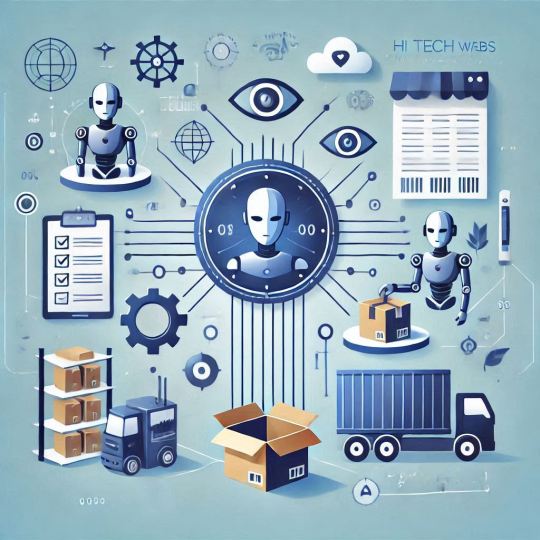#Artificial intelligence inventory management
Explore tagged Tumblr posts
Text
Revolutionizing Warehousing: Artificial Intelligence in Inventory Management

Summary: This Blog is about the dynamic landscape of warehousing, artificial intelligence (AI) is driving a paradigm shift in inventory management. By harnessing AI's predictive analytics and automation capabilities, warehouses can optimize stocking levels, enhance efficiency, and make data-driven decisions in real-time, leading to unprecedented levels of productivity and cost-effectiveness. Embrace the future of warehousing with AI for inventory management.
Introduction:
In the fast-paced world of logistics, efficiency is paramount. With the advent of artificial intelligence in inventory management in warehouses has undergone a remarkable transformation. Today, AI-powered systems optimize stock levels, streamline processes, and enhance decision-making, leading to unprecedented levels of productivity and cost-effectiveness.
The Power of AI for Inventory Management:
AI algorithms analyse vast amounts of data in real-time, allowing warehouses to predict demand, optimize storage space, and streamline operations.
Predictive Maintenance:
By utilizing AI, warehouses can implement predictive maintenance systems, which anticipate equipment failures before they occur, reducing downtime and ensuring smooth operations.
Dynamic Inventory Optimization:
AI-driven inventory management systems continuously analyse factors such as seasonality, demand fluctuations, and supplier performance to optimize inventory levels and reduce carrying costs.
Enhanced Order Fulfilment:
With AI, warehouses can prioritize orders based on factors like urgency, location, and order history, ensuring faster delivery times and higher customer satisfaction.
Real-Time Monitoring and Decision-Making:
AI empowers warehouses with real-time monitoring capabilities, allowing managers to track inventory levels, identify trends, and make informed decisions instantly. By harnessing AI's predictive analytics, warehouses can anticipate demand fluctuations and adjust inventory accordingly, avoiding costly delays and stock shortages.
Latest Trends and Stats:
According to a report by Allied Market Research, the global AI in the logistics market is projected to reach $6.5 billion by 2023, with a compound annual growth rate (CAGR) of 42.9% from 2017 to 2023. Furthermore, a survey by MHI found that 28% of respondents are currently using AI for inventory management, with an additional 47% planning to implement it within the next five years.
Conclusion:
As technology continues to evolve, AI will play an increasingly integral role in revolutionizing warehouse operations. By leveraging AI for inventory management, warehouses can achieve unprecedented levels of efficiency, accuracy, and cost-effectiveness. Are you ready to embrace the future of warehousing with AI? Contact us to learn how AI-powered inventory management can transform your operations and propel your business forward.
0 notes
Text

Artificial Intelligence at the Core of Modern Inventory Systems
AI in Inventory Management
2 notes
·
View notes
Text
Technology in Hospitality
Technology related to software has had the most prominent technology when it come to the development of Drive- thru window. Advance ordering system with great communication devices like LED screens and earphones make the drive thru experience more faster and efficient.

2) Hi there,
I can understand your concern about surveillance in dinning areas. I want to take a moment to explain why we to install cameras in dinning areas. It help us to keep an eye on any unusual activity and to investigate any theft case. We strictly use the surveillance recordings for investigation purposes only.

3) Advancement in technology helping to reduce the labour cost. Automation technology helps to manage payrolls of employees by itself. Data technology provides data collection and analyzing tools which helps in HR management. Ways it will influence job seekers and employers are:- flexibility in work schedule and virtual meetings.

4) In upcoming years the tasks like menu planning, inventory management and customer feedback analysis will performed by softwares. AI technologies will used for many tasks like serving and taking orders.

3 notes
·
View notes
Text
In laboratories, where potentially hazardous substances are part of daily operations, ensuring safety is not just a priority — it’s a necessity. One often overlooked yet powerful contributor to safer lab environments is Chemical Inventory Management Software (CIMS). From minimizing human error to enabling real-time compliance, this digital tool is revolutionizing how labs handle chemicals.
#sds management software#chemical inventory management software#artificial intelligence#sds management software for college#lab safety
0 notes
Text
Car Dealer Inventory Management Software

#crm#dms#crm services providers in gurugram#crm services#dealermanagementsystem#dealership management services#dms services#dms services providers in gurugram#software#artificial intelligence#inventory management
0 notes
Text
The Rise of Live Commerce Platforms in India: How Livestream Shopping is Shaping the Future of E-Commerce
Live Commerce Is Booming in India! From fashion hauls to tech unboxings, live-streamed shopping is reshaping how Indians discover and buy products online. With influencers hosting real-time product showcases and audiences making instant purchases, the line between content and commerce is fading fast.

📱 As platforms like Amazon Live, Flipkart Live, and social commerce apps evolve, brands are tapping into engagement-first commerce. This is not just a trend — it’s the future of e-commerce.
💡 Want to know how your brand can ride the live commerce wave? 👉 Read the full story: [blog link here]
#engagement-first commerce#artificial intelligence#order management system#unified commerce platform#inventory management software
0 notes
Text
Why settle for ordinary when your Food Delivery App can be extraordinary?

In the era of digital-first dining, food delivery has evolved from a convenience to an expectation. But behind every seamless order is a complex ecosystem that demands more than just a functional mobile app. It requires smart integration, real-time efficiency, and personalized experiences exactly what an End-to-End Food Delivery App Development with integrated POS and CRM systems delivers.

As a leading Food Delivery App Development Services provider, at KrishnaPadam IT Solution, we help food industry businesses break out of traditional tech molds and embrace innovation with confidence. We embed cutting-edge technologies like AI, machine learning, IoT, real-time GPS tracking, cloud-based infrastructure, and even blockchain transparency to keep your app ahead of the competition. Whether you're launching a next gen app or upgrading your current platform, or integrating Artificial Intelligence for personalized menus, our on demand developers delivers what you need or when you need it.

Ready to reimagine your food delivery business? Read more https://www.kpis.in/blog/end-to-end-food-delivery-app-development-with-integrated-pos-crm-systems-a-complete-guide/ and build a solution that’s not just functional, but smart, scalable, and sustainable.
#web development#app development#game development company#artificial intelligence#internet of things#game development#technology#application development#iot#information technology#software#restaurant app development#restaurant erp#restaurant management software#restaurant management system#food delivery app development company#food industry#restaurant inventory management#restaurant industry
0 notes
Text
Automatisasi Bisnis dengan Kekuatan AI
Automatisasi bisnis telah menjadi topik utama dalam dunia usaha modern. Dengan kemajuan teknologi kecerdasan buatan (AI), perusahaan kini memiliki peluang untuk mengoptimalkan proses mereka, meningkatkan efisiensi, dan mengurangi biaya operasional. AI tidak hanya menggantikan tugas-tugas manual yang berulang tetapi juga membawa kemampuan analisis data yang canggih, prediksi yang akurat, dan…
#AI automation#AI benefits#AI challenges#AI in banking#AI in business#AI in logistics#AI in retail#AI training#AI trends 2024#AI-powered tools#artificial intelligence#business automation#business innovation#cost reduction#customer experience#ethical AI#future of AI#operational efficiency#predictive analytics#scalable solutions#smart inventory management#supply chain management#workforce automation
0 notes
Text
Beyond Transactions: Enhancing Customer Engagement with B2C Digital Commerce Platforms

View On WordPress
#artificial intelligence#B2C digital commerce#B2C digital commerce platforms#business#DCP#digital commerce#Information Technology#inventory management#iot#Machine Learning#Retail
0 notes
Text
AI-Powered Inventory Management: From Shelf to Sale

As the retail landscape continues to evolve, the importance of efficient inventory management cannot be overstated. Embracing cutting-edge technology has become imperative, and at our company, we proudly assert that AI is at the forefront of revolutionizing retail inventory management. From optimizing shelf space to streamlining the entire supply chain, our AI-powered inventory management solutions are making significant strides.
The State of Retail Inventory Management
Recent statistics reveal the challenges retailers face in managing their inventory efficiently. On average, businesses lose over $1.75 trillion annually due to overstock and understock issues. Traditional methods often fall short in adapting to the unpredictability of consumer demand.
1. The AI Advantage in Retail Inventory Management
In the realm of Artificial Intelligence inventory management, our company stands as a pioneer. Leveraging advanced algorithms, our AI system analyzes historical data, current trends, and seasonality to predict demand accurately. This enables retailers to optimize stock levels, preventing both overstock and stockouts, ultimately enhancing customer satisfaction and maximizing profits.
2. Dynamic Shelf Management
AI goes beyond traditional inventory management by introducing dynamic shelf management. Smart shelves equipped with sensors and AI algorithms continuously monitor product levels. When stock is running low, the system automatically triggers reorders, ensuring that shelves are consistently stocked with the right products. This not only reduces manual intervention but also enhances the in-store shopping experience.
3. Demand Forecasting for Seasonal Variations
One of the challenges in retail is handling seasonal fluctuations in demand. Our AI-driven system excels in forecasting these variations. By analyzing historical sales data and external factors such as holidays or events, the system predicts demand shifts. Retailers can then adjust their inventory levels accordingly, optimizing resources and minimizing excess stock during off-peak seasons.
4. Supply Chain Optimization
Efficient supply chain management is critical for timely product availability. Our AI-powered inventory management extends its capabilities to the entire supply chain. From supplier management to logistics optimization, AI ensures a seamless flow of products from manufacturers to retailers. This not only reduces lead times but also minimizes the risk of stockouts, fostering a more resilient supply chain.
5. Preventing Losses with AI Fraud Detection
AI isn't limited to optimizing stock levels; it also plays a crucial role in preventing losses. Through anomaly detection algorithms, our system identifies unusual patterns in sales or discrepancies in inventory data, alerting retailers to potential fraud or theft. This proactive approach helps in minimizing losses and maintaining the integrity of the inventory.
Challenges and Future Developments
Despite the evident benefits, challenges such as initial implementation costs and data security concerns persist. However, ongoing advancements promise even more sophisticated AI solutions, making them more accessible and cost-effective for businesses of all sizes.
Assert AI has unveiled Pratham, a revolutionary no-code video analytics solution. Tailored for retailers, Pratham simplifies AI-based video analysis, empowering businesses with effortless implementation and insightful data-driven decisions to enhance operations.
The evolution of inventory management from shelf to sale is now seamlessly powered by AI, and at Assert AI, we are at the forefront of this transformative journey. Our computer vision-based solutions redefine efficiency for retailers, ensuring precise inventory control. Contact us today for a free demo and embark on a future where smart technology meets the retail aisle
0 notes
Text
Manufacturing industries rely on various chemical substances to keep production running efficiently. However, some of these chemicals are flammable and require careful storage and handling. If not managed properly, even a small spark or a simple oversight can trigger a fire or explosion, putting people and property at serious risk.
0 notes
Text
Artificial Intelligence Recommender Systems | AI Inventory Management

Artificial intelligence (AI) has become a revolutionary force in e-commerce, transforming the way that inventory management and personalized buying are done. AI has completely changed how businesses interact with their customers and manage their supply chains by utilizing complex algorithms and machine-learning approaches. Artificial Intelligence Recommender Systems in e-commerce allow organizations to provide customized product recommendations, improving customer experience and increasing conversion rates. Not only that, but AI-powered inventory management reduces waste, manages stock levels, and predicts demand changes with abnormal accuracy. The use of artificial intelligence in e-commerce technologies not only optimizes processes but also places businesses in a competitive and changing market. AI will play an increasingly important role in e-commerce as it develops, bringing in a new era of productivity, profitability, and customer engagement.
Personalized Shopping Experiences with AI Recommendation Systems
Because consumers have so many options in the digital age, it has become harder for businesses to stand out. However, Artificial intelligence recommender systems have become an effective tool for customizing shopping experiences, increasing customer loyalty, and increasing sales. This revolutionary technology changes how businesses interact with their customers by offering many types of advantages and dramatically raising conversion rates.
1. The Benefits of AI-Powered Recommendations
Artificial intelligence recommender systems use complex algorithms to examine a large quantity of data, such as demographic data, buying patterns, and surfing history. Artificial intelligence uses this data, to predict customer preferences accurately, and provide specific recommendations. This degree of personalization improves the buying experience by showcasing pertinent goods or services that are catered to the preferences and requirements of every customer. Customers feel appreciated and understood as a result, which promotes brand loyalty.
based on artificial intelligence product suggestions save consumers time and effort by improving the decision-making process and identifying appropriate products. As well as increasing user pleasure, this simplicity promotes recurring business and long-term connections with clients. and companies can maximize income prospects and spur growth by effectively cross-selling and upselling products by showing relevant items.
2. Increased Conversion Rates
Artificial intelligence recommender systems have several benefits, but one of the biggest is that they can significantly boost conversion rates and with it, Businesses can grab customers' attention and lead them in the direction of a purchase by providing personalized recommendations. based on artificial intelligence personalization has a significant influence on consumer behaviour, as evidenced by research showing that individualized product recommendations can boost conversion rates by up to 30%.
Also, by causing users to investigate more products or upgrade to premium options, artificial intelligence uses suggestions to raise average order values. For companies looking to optimize their profitability and competitiveness in a congested market, this additional revenue increase is very beneficial. Through the utilization of artificial intelligence, companies can successfully differentiate themselves from the competition and craft captivating shopping experiences that increase customer conversion rates and revenue.
How AI Recommender Systems Work
Artificial intelligence recommender systems, which utilize complex algorithms to analyze large datasets and calculate user preferences for customized recommendations, have completely changed the way we discover online information, products, and services. These systems are primarily built on machine learning techniques, which allow for ongoing learning and adaptation in response to user interactions. First, they are trained on past data that includes item qualities, user behavior, and preferences. This allows them to identify patterns and connections in the data. Then, by using different recommendation algorithms, like content-based filtering and collaborative filtering, these systems produce customized recommendations. While content-based filtering suggests products based on attributes and previous interactions, collaborative filtering connects users with similar likes by suggesting items loved by others with related preferences.
Hybrid recommender systems combine multiple algorithms to improve recommendation diversity and accuracy. They do this by utilizing the advantages of various techniques to overcome individual shortcomings and improve overall performance. Artificial intelligence recommender systems improve their recommendations by continuously obtaining user feedback. This updates user preferences and improves the accuracy of the following suggestions. To increase the user experience, they include real-time data, such as trending goods and user activity, to guarantee recommendations are current and appropriate. Artificial intelligence recommender systems continue to adapt to the changing demands and tastes of consumers in the online environment, due to the smooth integration of complex algorithms and machine learning.
Artificial Intelligence in Inventory Management
AI inventory management harnesses advanced algorithms and machine learning techniques to analyze vast amounts of data in real-time. This data encompasses various factors including historical sales data, market trends, supplier information, and even external factors like weather patterns or economic indicators. By processing this wealth of information, AI algorithms can generate precise forecasts, anticipate demand fluctuations, and make data-driven decisions to optimize inventory levels.
1. Optimizing Stock Levels with AI
One of the primary challenges in inventory management is striking the delicate balance between stockouts and excess inventory. Stockouts result in lost sales and dissatisfied customers, while excess inventory ties up capital and increases carrying costs. AI inventory management addresses this challenge by continuously analyzing demand patterns and adjusting stock levels accordingly.
Through sophisticated demand forecasting models, AI algorithms can predict future demand with unprecedented accuracy. By considering various factors such as seasonality, promotional events, and even social media trends, AI can generate forecasts that reflect the dynamic nature of e-commerce markets. Armed with these insights, businesses can proactively adjust their inventory levels, ensuring they have the right products available at the right time. AI-powered inventory optimization goes beyond traditional forecasting methods by incorporating real-time data feeds. By monitoring sales trends as they unfold and adapting to sudden changes in demand, AI algorithms can prevent stockouts and minimize the risk of overstocking. This agility is crucial in fast-paced e-commerce environments where market dynamics can shift rapidly.
2. Reducing Waste Through AI
to optimizing stock levels, AI inventory management plays a pivotal role in reducing waste throughout the supply chain. Excess inventory not only ties up capital but also increases the likelihood of products becoming obsolete or reaching their expiry date. By accurately predicting demand and aligning inventory levels accordingly, AI helps minimize the occurrence of overstock situations.
Furthermore, AI algorithms can identify slow-moving or stagnant inventory proactively. By flagging these items early on, businesses can take proactive measures such as targeted promotions, bundle offers, or liquidation strategies to clear excess stock and prevent write-offs. This proactive approach not only reduces waste but also maximizes the return on investment for each product in the inventory.
3. The Future of E-commerce Inventory Management
As e-commerce continues to evolve, so too will the role of AI in inventory management. Advancements in artificial intelligence, coupled with the proliferation of data sources, will further enhance the capabilities of AI-powered inventory systems. Predictive analytics, prescriptive insights, and autonomous decision-making will become increasingly commonplace, empowering businesses to stay ahead of the curve in an ever-changing market landscape.
AI inventory management will extend beyond the confines of warehouses and distribution centers, permeating every aspect of the supply chain. From demand planning and procurement to logistics and fulfillment, AI algorithms will optimize operations at every touchpoint, driving efficiency and profitability for e-commerce businesses.
Conclusion
Ecommerce and supply distribution processes are changing as a result of the implementation of artificial intelligence in e-commerce, inventory management, and customized shopping experiences. Artificial intelligence (AI) recommender systems use complex algorithms and machine learning approaches to customize recommendations based on user preferences, increasing client satisfaction and loyalty. At the same time, waste is reduced, inventory levels are optimized, and operational efficiency is improved through AI-powered inventory management. Artificial intelligence will have an ever-larger part in e-commerce, transforming supply chain management and customer interactions for organizations. In order to remain competitive while maintaining outstanding shopping experiences in the age of the Internet, businesses must adopt these technologies.
For further exploration of compelling AI subjects and associated proficiencies, we invite you to visit our website and stay abreast of the newest skill advancements.
0 notes
Text
What is the impact of artificial intelligence on e-commerce?
Understanding the influence of artificial intelligence (AI) on e-commerce is essential in today’s digital landscape. AI technologies are reshaping how businesses operate online, from personalized shopping recommendations to efficient inventory management. This article delves into the multifaceted impact of AI on e-commerce, exploring its benefits and transformative potential.
Know more https://www.pcdoctorsnet.com/what-is-the-impact-of-artificial-intelligence-on-e-commerce/

#What is the impact of artificial intelligence on e-commerce#ai#artificial intelligence#ecommerce website design#ecommerce#digital marketing#usa#seo#seo services#digital marketing services#social media marketing#best digital marketing company#seo company#marketing#business#digital marketing company#digital marketing agency#supply chain management#supply chain#inventory management#PC Doctors .NET#Strategies#payment processing#customer retention
0 notes
Text
The restaurant industry is evolving at lightning speed, and Artificial Intelligence is the game-changer driving innovation! From Order Management to AI-driven menu recommendations, and automated kitchens to smart POS systems, restaurants are leveraging AI to increase efficiency, reduce costs, and boost revenue.
Smart POS Systems – AI-powered POS solutions streamline orders, payments, and inventory management, reducing errors and improving efficiency.
Personalized Dining Experience – AI analyzes customer preferences to offer tailored food recommendations and promotions.
Automated Chatbots & Virtual Assistants – Enhance customer service with instant reservations, order tracking, and FAQs.
AI-Powered Inventory Management – Reduce waste and optimize stock levels with real-time demand forecasting.
Robotic Food Preparation – Speed up service with AI-powered kitchen automation and smart cooking assistants.

At KPIS Pvt. Ltd. we use cutting-edge technologies like AI, Machine Learning, and data analytics, to create innovative restaurant management solutions that not only streamline operations but also enhance customer engagement and satisfaction.
Stay ahead of the curve and and discover our detailed blog to learn more about how AI is revolutionizing the restaurant industry for 2025.
🔊𝐂𝐨𝐧𝐭𝐚𝐜𝐭 𝐔𝐬🔊 ➖➖➖➖➖➖➖➖ 🌐 𝐕𝐢𝐬𝐢𝐭: https://www.kpis.in/blog/how-is-ai-revolutionizing-the-restaurant-industry/ 📧 𝐄𝐦𝐚𝐢𝐥: [email protected] 📞 𝐂𝐨𝐧𝐭𝐚𝐜𝐭: +91-6350359218 ➖➖➖➖➖➖➖➖➖
#restaurant inventory management#restaurant app#restaurant management system#restaurant app development#ai dedevelopment services#ai#artificialintelligenceapplication#app development#web development#technology#artificial intelligence#internet of things#application development#iot#game development#ai in restaurant app#ai in restaurant and food
0 notes
Text
Peran AI dalam Mempercepat Manajemen Rantai Pasokan
Manajemen rantai pasokan adalah tulang punggung operasional bisnis, yang mencakup pengelolaan aliran barang, informasi, dan keuangan dari pemasok ke konsumen. Dalam era globalisasi dan digitalisasi, tantangan dalam rantai pasokan semakin kompleks. Di sinilah kecerdasan buatan (AI) memainkan peran penting. AI tidak hanya memberikan efisiensi tetapi juga mempercepat berbagai aspek manajemen rantai…
#AI challenges#AI in logistics#AI in supply chain#artificial intelligence#blockchain integration#cost reduction#customer satisfaction#future of AI#inventory optimization#IoT in supply chain#logistics efficiency#predictive analytics#real-time data#supply chain automation#supply chain innovation#supply chain management#supply chain transparency#supply chain trends#sustainable supply chain#warehouse management
0 notes